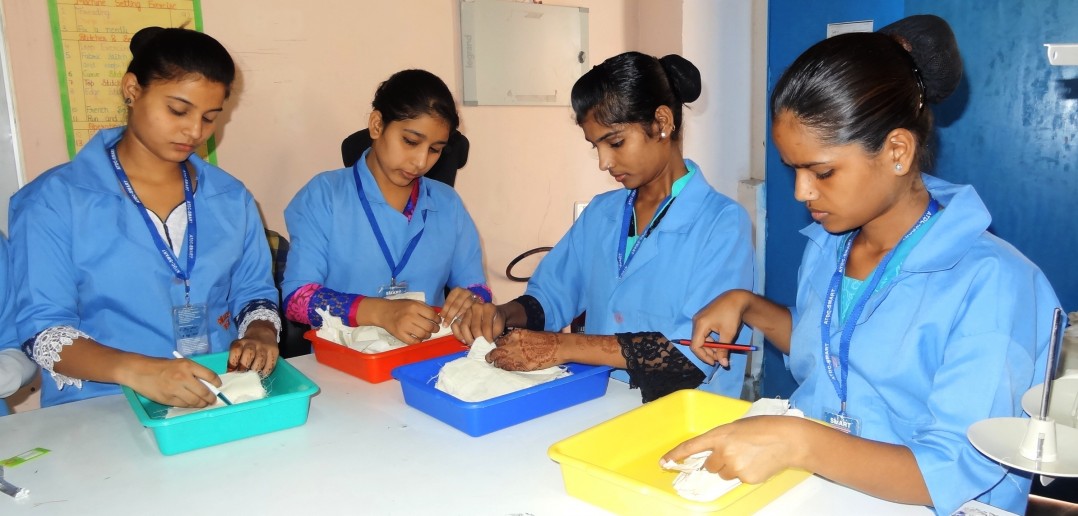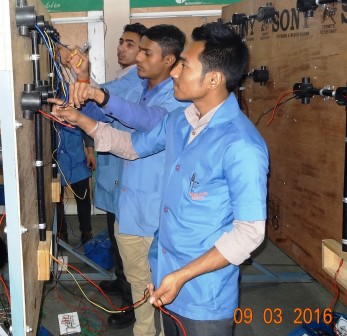With social responsibility as one of the seven core values of the company, GMR Group has successfully implemented several initiatives in education and skill development with sustained positive impact. In this Skill Story, Meena Raghunathan, Director, Community Services, at GMR Varalakshmi Foundation (GMRVF) traces their journey and tells us more about how the foundation mainly works with communities around their businesses.
GMRVF was founded and mentored by the Group Chairman, Mr. G. M. Rao and his vision for inclusive growth has always been a priority along with several other business interests. The foundation realizes his vision through several CSR projects that have touched the lives of around five lakh people with initiatives in education, skill development, health, hygiene and sanitation and empowerment and livelihoods. Our philanthropic journey started almost 35 years ago from a small place called Rajam in Andhra Pradesh and has now reached to 25 locations in India and two locations in Nepal.
GMRVF has established several educational institutions like GMR Institute of Technology, degree colleges and schools. There are about 10,000 students studying in these institutions. The GMR group partners with government schools to improve the quality of education and collaborate with corporates and non-profits for educating unprivileged children.

Empowerment through sustained livelihoods
We enable communities with various livelihood programs focusing resources, market and skills. Since 2003, we have trained more than 37,000 school and college dropouts in 35 different trades and helped more than 80% of them settle in earning their livelihood through job placement/start up their own enterprises. At present, there are 10 Vocational Training Institutes (VTI) which train 5500 youth annually.
Partnering with the industry for vocational training
This is one of the key features of all our programs. There are more than 30 market driven trades where vocational training is being imparted with gainful employment opportunities. This includes a wide range of trades like Excavator Operator, Electrical, Refrigeration, AC maintenance, Two wheeler repair, Cargo Management, Garment Quality Checker, Retail, Data entry operator, BPO skills etc.

This approach has helped us tremendously in identification of skilled job roles, development of relevant curriculum, technical inputs, innovative practices, infrastructure and equipment support, identification of trainers, facilitating on the job trainings and placements. Leading industries like Ashok Leyland, Hero Motocorp, Voltas, Volvo, Schneider Electric, ATDC, VDMA, TATA-BSS, CELEBI and Castrol are partners for the courses. We also work with Saint-Goblin Gyproc for skilled workforce in the field of dry walls and false ceiling or Air Cargo management course with CELEBI. The placement rate of our centers is more than 80%. The trainees are jointly assessed by the course partners and Foundation and are provided with joint certificates with industries.
Importance of self-employment
We have six vocational training centers in rural areas. Many of the courses here are focused on creating and supporting self-employment in local areas. Andhra Bank, a significant partner in our vocational training, plays a major role in facilitating loans for the trainees. The trainees are sensitized on various aspects of startups for six months.
Sustainable livelihoods for women
We also work with about 300 Self Help Groups to facilitate self-employment ventures. The women are supported with required training, marketing and other inputs. The products are marketed through an initiative called EMPOWER (Enabling Marketing of Products of Women Entrepreneurs) and sold through our outlets at Hyderabad and Delhi International Airports. We also sell them through exhibitions, take bulk orders for conferences and seminars and through our ecommerce portal. We also support farm based families through our rural livelihoods programs.
Overcoming challenges in program implementation
We are fortunate to have good partners who own the process along with us. Working with school dropouts requires different approaches to induce confidence in the students, and match their aspirations . Our faculty are trained well to handle these issues by identifying the weak linkages at an early stage and regularly counsel them. We handhold trainees for at least six months after the placements and address their problems. We have also developed a feedback mechanism with the employers and the results are incorporated in the course curriculum.
Mobilizing candidates for skill development program
We follow a systematic approach for mobilization of candidates for the programs. We target unemployed youth from villages around the area of business operations and this is organized through camps or grassroot level NGOs. These drives happen once a month before the commencement of the courses. An interest mapping and counselling session is administered with each of the candidates. Based on the interest, background and availability of seats, the courses are allocated to the trainee.
Holistic curriculum and standards
Yoga, outdoor activities, personality development, communication sessions, shramdaan and mock Interviews are an essential part of our holistic course curriculum. Structured sessions are carried out across all the courses on job preparedness, communication, job ethics, stress management and team building. The trainees are exposed to industry practices on quality aspects of 5 S and Kaizen, Fire Safety, and Environmental Health and Safety measures.
We have standardized every step in the process – operations, mobilization of youth, counselling, and training on soft skills, on-the-job training, placement, post placement support and feedback mechanism from stakeholders including trainees, industry partners, placement companies – all this helps us maintain quality across our initiatives. Most of the courses are in line with NSQF and affiliated with Sector Skills Councils like Electronics SSC, Automotive SSC, Apparel SSC, Retail SSC to mainstream our trainees with the programs like PMKVY. In Andhra Pradesh and Telangana some of our courses are linked with state government programs like MEPMA.
We are happy that we’ve been able to work with so many youth and create meaningful livelihoods. We look forward to doing much more; not just by ourselves, but also by sharing our learning and experiences with others.














Comments 1